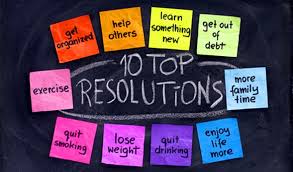We often procrastinate and then put pressure on ourselves to make some major change on January 1. Except that we may not have a solid plan, or any plan at all for that matter, as to how we are actually going to make this major life change.
The reality is that major change and results don’t usually happen overnight. Major change typically requires making a series of smaller changes. For example, think of something as seemingly simple as moving from one apartment to another. You don’t just grab your stuff and go. There are many steps involved prior to making the actual move. First you have to find a new apartment in a location you like that fits your needs and budget. Then you fill out an application and wait for approval, upon which you pay the fees to move into the new apartment. You have to give notice to your current landlord, get all your utilities switched over, go through your things, get rid of those you no longer want or need, pack the things you are moving, line up a truck and help, move everything, and clean up your old apartment. And it’s even more complicated if you are selling and purchasing homes. Either way, there is a series of several small steps you have to do to end up with the final result, moving into a new apartment. In this case, once the final result is achieved, you’re done.
Personal changes such as improving health, weight loss, relationships, and finances are even more complicated. Why is that? Because these changes involve changing our habits. Those behaviors we do automatically, over and over again, without thinking. Those behaviors that over time created the problem we want to change.
If our goal is to lose weight, we have to eliminate all our habits that cause us to gain weight. And we have to create new habits that help us lose weight. The bigger the change, the more habits we likely have to change in order to achieve that big change.
You may have a whole series of little habits that contributed to your weight gain and you need to change. Maybe you add cream and/or sugar to your coffee, butter your white toast, grab a few pieces of candy every time you walk past the breakroom, use the creamy dressing on your healthy salad, get that mid-afternoon snack out of the vending machine, sit at your desk most of the day, then sit on the couch for the rest of the night with the fast food you grabbed on your way home because you’re hungry and tired, and don’t want to cook. If you suddenly eliminate all of these habits you will have a void to fill.
You can replace each of those habits with a healthier habit that promotes weight loss. Maybe you could drink your coffee black, have a piece of whole-grain toast with hummus, snack on fruit or veggies instead of the candy and vending machine snacks, and do a little meal planning and preparation to have healthier dinners at home. You may also go for a walk on your lunch break or when you get home.
Sounds easy, right? Well, it is, except that it’s going to be hard to change so many habits all at once. As creatures of habit, if we change up too many small things at once, it can take us too far out of our routines, making it hard to sustain all those changes.
Darren Hardy wrote a great book called “The Compound Effect”. His book is based on the principles that small, smart choices done consistently over time result in radical changes. And I mean small choices. Choices so small, so subtle, that change seems imperceptible. If you’re looking for a big change, you may even be thinking “Why even bother with small, imperceptible changes?”.
Here’s why. Small, manageable changes are much easier for us to do, which increases the likelihood that we will consistently continue with that change and turn it into a habit, so eventually we will do it automatically without thinking about it. It takes about 21 days of doing something consistently to turn it into a habit.
For example, if you replace the habit of grabbing a bag of chips to snack on after work with grabbing a bag of baby carrots instead, you will be saving yourself a few hundred calories per day. While eating baby carrots may not seem as exciting as eating chips during those first three weeks, just wait. You will find yourself actually wanting those baby carrots when you get home from work, and that’s what you will automatically grab.
You probably won’t see weight loss right away just from eating baby carrots instead of chips. But you may notice that you don’t eat as much during or after dinner because you filled up on the baby carrots before dinner. You may also notice that after having those baby carrots, a nice salad sounds good with dinner. You may begin to feel a little lighter and want to go for a walk in the evening. And those things may result in your clothes fitting a little looser, which may inspire you to make another small, manageable change that leads to other changes that eventually grow into new habits that result in sustainable weight loss.
That’s the compound effect. Little changes and the cumulative effects of those little changes add up over time to create big changes that are sustainable. The caveat is that you have to be patient. The major change does not happen overnight. It takes time. However, with seemingly little effort you eliminate the bad habits that created the problem you want to change and you create new habits that, because they become habits, virtually assure that the change you achieve will be permanent.
What is one small, seemingly imperceptible change you can make today that will start you on your path to the change you desire?
Happy New Year!




 RSS Feed
RSS Feed